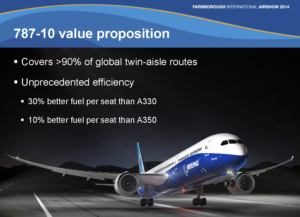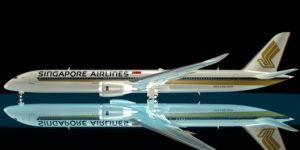Singapore Airlines formally announced a deal today for 20 777-9 and 19 787-10 Boeing airliners during a ceremony at the White House. The order was previously attributed to an unidentified customer, and is worth $13.8 billion at list price. Airlines usually negotiate large discounts off the list price, and the deal is estimated to actually be around $6.5 billion. The deal will help to sustain more than 70,000 direct and indirect jobs in the United States. Singapore Airlines also added options to take delivery of up to 6 additional 777-9’s and 6 787-10 aircraft.
The airline will be the launch customer for the 787-10. The aircraft are scheduled to begin deliveries in the first half of 2018, and the new order is in addition to a prior order for 30 787-10’s. Singapore now has 49 787-10’s on order, making it the largest customer for the latest 787 aircraft type. The carrier plans on using the new 787-10 version on its medium-range routes, with the 777-9 operating on the airlines longer-haul routes. The large Asian air carrier and its subsidiaries operate the Boeing 737-800, 737-MAX 8, 787-8, 787-9, 777, and 747-400 aircraft types.
The deal for the new Boeing jets comes on the heels of the airlines announcement last May that they will not be renewing the leases on the first 5 of their Airbus 380 jets. The first of those 5 will be returned to its lessor in October, 2017. The next four will be retired over the following year. Singapore Airlines does have another five A380’s currently on its order book scheduled for deliveries in 2018 and 2019. It would not surprise me if these orders ended up being canceled, or converted to a different Airbus aircraft type. The A380 has failed to live up to European plane makers expectations, as only 216 aircraft are in service with 13 operators as of September 30, 2017. There are “officially” orders for about 100 more aircraft, but those deliveries are on shaky ground, at best. Emirates appears to be the only airline that has been able to make the A380 fleet work, but they have deferred their remaining A380’s on order amid slowing growth.

